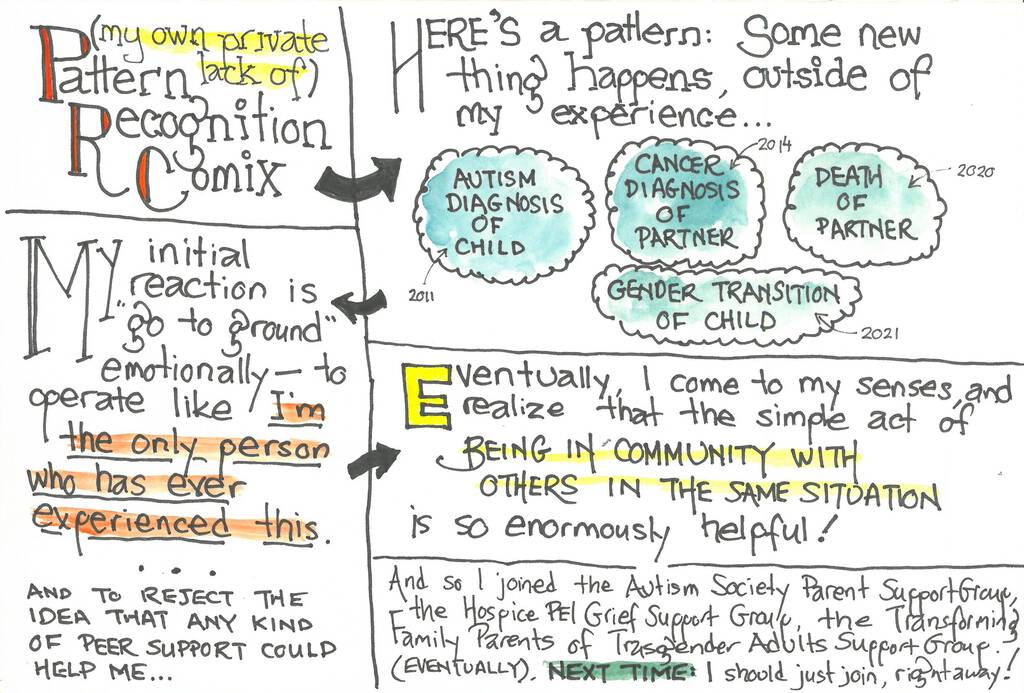Here’s a pattern I’ve noticed in myself: some new thing happens, a thing outside of my lived experience. Rather than expanding to embrace this new thing, I go to ground, grit my teeth, and assume that my experience of this new thing is unique, never before experienced by anyone else ever, and that if I simply try really hard, I can self-reliantly figure out everything that needs to be figured out.
I did this in 2011 when Olivia was diagnosed with autism. I did this in 2014 when Catherine was diagnosed with incurable cancer. I did this in 2020 when Catherine died. And, most recently, this was my reaction when Olivia came out as a trans woman.
What I need to keep reminding myself, over and over and over, is that the way out of this pattern—because, let’s face it, it’s a harmful and self-defeating pattern that gets me nowhere—is to seek out peer support.
For years I rejected the idea of talking to other family members raising autistic children: I was convinced this would somehow be a denial of Olivia’s unique experience of autism, and my unique experience as her father. It was only when I got up the courage to attend a parent support group meeting organized by the Autism Society, a meeting where I looked into the tear-filled eyes of a father from Montague overwhelmed by his child’s meltdowns in exactly the same way I was, that I felt the enormous power of simply being in community with others living through the same experiences.
When Catherine died last year, I failed to apply this lesson, hunkered down, and remained dogged in my commitment to “powering through” grief. One Friday last May I received a call from Hospice PEI inviting me to a men’s grief support group. I naively told them that, no, I didn’t need help, and that everything was just fine. Fortunately, over the following weekend I came to my senses, called them back, and signed up. The eight weeks I spent in that group, plus the monthly grief support group drop-ins ever since, have played a large role in helping me keep my head above water, in helping me understand grief on a deeper level and, quite simply, in not feeling so absolutely alone.
When Olivia came out as a trans woman in May there was some evidence that I might have learned my lesson: I reached out to Peers Alliance looking for family support resources. Which they sent. And which I then let languish in my email inbox. “Everything’s fine,” I told myself, “I’ve got this.”
It wasn’t until a conversation with another parent of a trans young adult who spoke glowingly of the power of a peer support group for the parents of trans children, that I found my way to Transforming Family, a Los Angeles-based support group for “children, adolescents and their families to explore issues of gender identity.” I filled out an intake form yesterday, got a phone call a few hours later, and last night I attended my first meeting, on Zoom, of “Parents of Transgender and Non-binary Adults.” I’m so happy I did: again, the power of sharing space–safe, informed, positive space–with others in my situation, was helpful on many levels.
What I need to remember time and time again–which is why I’m writing this down–is that while peer support can help answer questions, get pointers to resources, avert possible crises, its true power lies simply in admitting to myself I don’t have to take this on myself.
Seeking support doesn’t mean I’m a bad person, it doesn’t mean I’m not autism-positive, or trans-positive, or grief-positive. It simply means I’m a human being, willing to admit my limitations, and willing to admit that I can become a better person with the help of others.

 I am
I am
Comments
Yes. Thank you, a lesson
Yes. Thank you, a lesson worth to remind myself regularly of, certainly also with much less momentous live and work events.
Thanks for this, Peter, a
Thanks for this, Peter, a good reminder for me, too.
You are so wise. Thank you
You are so wise. Thank you for this. And that's a great infographic!
Add new comment